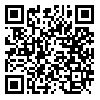Volume 6, Issue 3 (9-2012)
2012, 6(3): 1-9 |
Back to browse issues page
1- , z_saeedi@yahoo.com
Abstract: (10856 Views)
The present study examined the relationship between Self-Compassion, Self-esteem, Shame-Proneness and Guilt-Proneness with experiencing shame and guilt after reminding the experience of fault and transgression. To do so, in a quasi-experimental design, 80 students (26 males and 54 females) of the University of Tehran filled Self-Compassion and Self-Esteem Scales and Shame-Proneness and Guilt-Proneness subscales of the Test of Self- Conscious Affect-3. After shame and guilt induction by reminding and writing about an experience of fault and transgression, Participants reported their unpleasant emotions by the adjective-checklist of shame and guilt based on Tangney`s theory and the scale of unpleasant emotions. The Results revealed that shame-proneness was positively and self-compassion was negatively associated with the unpleasant emotions. Self-esteem was correlated negatively with the shame only and guilt-proneness showed no significant relationship with the unpleasant emotions. As hypothesized, self-compassion predicted unpleasant emotions that are beyond the shame-proneness and guilt proneness, while self-esteem wasn’t the predictor of the unpleasant emotions. The results were explained based on the different nature of self-compassion and self-esteem constructs.
Type of Study: Research |
Published: 2012/09/15
Published: 2012/09/15
| Rights and permissions | |
 | This work is licensed under a Creative Commons Attribution-NonCommercial 4.0 International License. |



